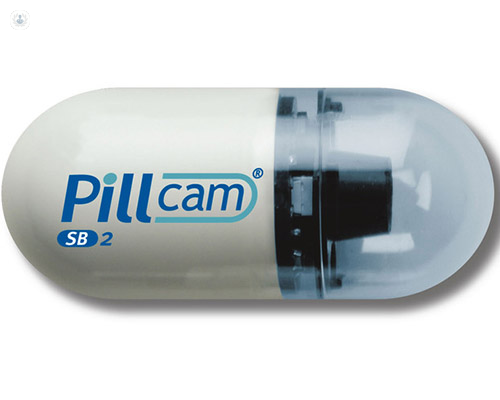Capsule endoscopy: how long does it take to pass?
Written in association with:Capsule endoscopy is a technique that potentially allows visualisation of the entire gastrointestinal tract. The procedure enables doctors to diagnose conditions such as coeliac disease, inflammation of the gut or, rarely, cancers. We’ve asked expert gastroenterologist Dr John Martin to explain just how it works and how long the capsule takes to pass through the digestive system.

What is capsule endoscopy?
The examination involves swallowing a small capsule about the size of a large vitamin pill, which contains a light source, a light sensitive chip, a battery and a transmitter. During passage through the gut the capsule takes and sends regular images to a belt worn by the patient and these are stored in a data recorder.
After the period of recording, the data recorder is connected to a computer and the images are downloaded to produce a video of the patient’s gastrointestinal tract.
What conditions can be diagnosed using capsule endoscopy?
Capsule endoscopy is mainly used to investigate the small bowel, as this is difficult to reach with standard endoscopes. In most cases, the patient would have already had an upper GI endoscopy and colonoscopy to exclude a problem in the stomach or colon.
The commonest reasons to perform capsule endoscopy are to identify a source of blood loss in iron deficiency anaemia or to investigate diarrhoea. Common diagnoses include collections of fragile blood vessels (angioectasia), coeliac disease, inflammation, such as Crohn’s disease, polyps or, rarely, cancers.
Although less commonly performed, capsule endoscopy can examine the oesophagus to screen patients with acid reflux for the presence of inflammation or Barrett’s oesophagus. It is also sometimes used to look for large veins in the oesophagus (varies) or to examine the stomach and duodenum. In addition, colon capsules can be used to screen patients for polyps or cancer and to diagnose inflammation.
Capsule endoscopy, however, is inferior to upper GI endoscopy or colonoscopy to examine the stomach or colon, as it is more likely to miss abnormalities and cannot take biopsies or remove polyps.
What can you eat after capsule endoscopy?
The capsule will normally leave the stomach within four hours of swallowing, so eating is not allowed during this time so that the capsule does not mix with food, which obstructs the view. It is, however, permissible to drink clear fluids two hours after swallowing the capsule.
How long does it take to pass a capsule endoscopy?
The time taken for the capsule to pass out in the stool is variable, and only about half of patients will see the capsule in the toilet. Transit times through the small bowel vary and are normally between two and six hours, so the colon is normally seen on the video after an eight-hour recording.
In these cases, the capsule will always pass out of the body, but when the colon is not seen (approximately one in 20 cases) and the patient does not see the capsule, an X-ray is taken after 14 days to make sure it is gone.
Can a capsule endoscopy have side-effects?
Capsule endoscopy is an extremely safe test and, although is generally avoided in patients who are pregnant or who have a cardiac pacemaker, these are rarely a problem. The commonest problem is the failure to pass through the whole small bowel, which is often the result of the slow movement of the capsule.
This means that the entire small bowel may not be examined, but the capsule will usually pass out in the stool. In some cases, where there is a narrowing of the bowel the capsule may not be able to pass, although this very rarely causes any symptoms.
If this happens, and medical treatment to reduce the narrowing is unsuccessful, the capsule may need to be retrieved, but careful selection of patients, to avoid the test in those at high risk of having a narrowing, significantly reduces the risk of capsule retention.
Do not hesitate to book an appointment with Dr John Martin if you're experiencing gastrointestinal problems.


